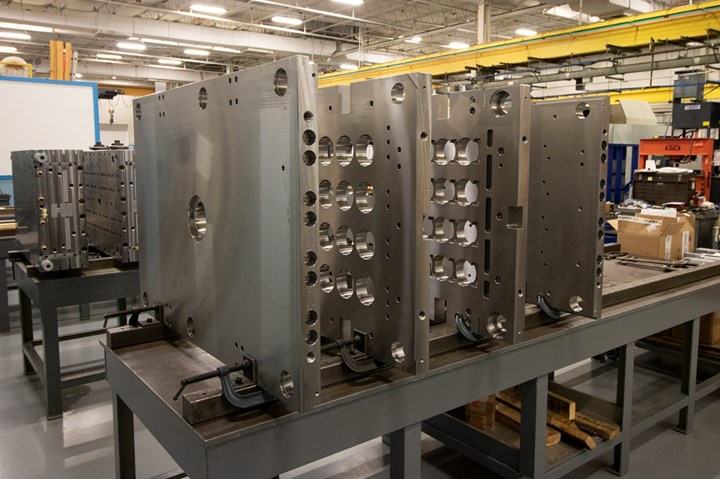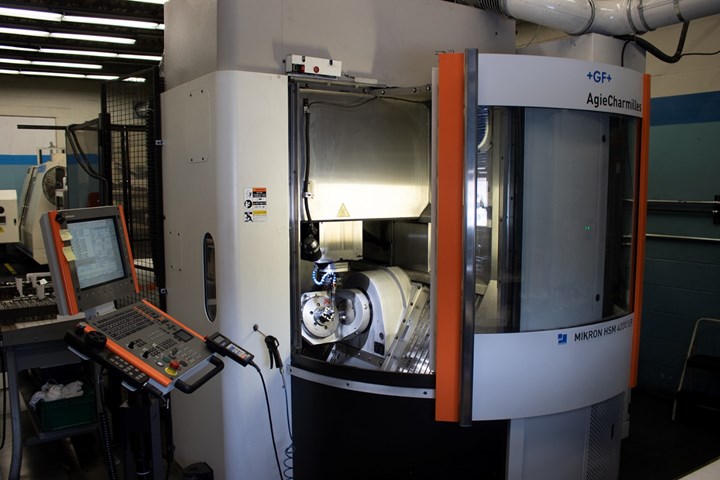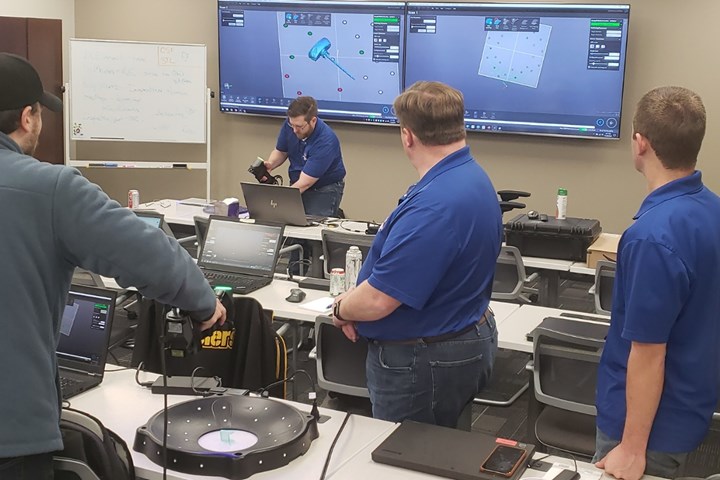
Both Triangle Tool and Penn Erie specialize in designing, building, and manufacturing large-frame custom mold for high cavitation. Images courtesy of The Plastek Group.
Give us a quick snapshot of the size of the company’s tooling divisions: Triangle Tool and Penn Erie.
Douglas Prischak, VP Global Tooling, and Engineering: These shops have been around more than 60 years. The Erie, Pennsylvania Tooling Divisions of The Plastek Group comprise a total of 76,278 square feet of combined workspace.
The Triangle Tool Division is 44,488 square feet, and the Penn Erie Division is 31,790 square feet, with a total of 97 employees, including three current apprentices between the two tool shops. The goal is to keep two to four apprentices on staff at all times.
What types of molds do Triangle Tool and Penn Erie design and manufacture?
Prischak: Both Triangle Tool and Penn Erie specialize in designing, building, and manufacturing large-frame custom mold for high cavitation. The largest frame built by Penn Erie was 52” wide by 61” long. Mold designs include stack tooling, single-face molds, unscrewing molds, and two-shot molds.
We pioneered—what are now industry standards—designing and building molds for in-press maintenance and the concept of component interchangeability.
What markets do Triangle and Penn Erie serve?
Prischak: Both operations are the middlemen to serving the injection plastics molding industry, offering mold design, building of injection and injection blow molds as well as services and tools to satisfy the overall production needs of consumer product packaging customers.
What are some of the critical equipment across these two tooling divisions?
Prischak: At Triangle, our five-axis hard mills, electrode milling machines, rough mills, lathes, grinders, EDMs, and CMMs are essential. We have invested in a multitude of machine tool technology to fit our needs, including Yasada, Makino, DMG Mori, Okuma, Hurco, Brown & Sharp, Charmilles, Mitsubishi, and Okamoto.
At Penn Erie, our arsenal includes Bridgeports, Cincinnati, Sunnen Hone, Okuma, Webb, (Grinding) Brown & Sharpe, Hermes Blohm, Okamoto, Okuma, Makino, Mazak, Bostomatic, Hurco, Mori Seiki, Mikron, Agie Charmilles, Comparitor CMM, and an Alflak laser welder.
Our newest piece of equipment is an Okuma five-axis lathe for EDM carbon featuring automation and a surplus of capacity to hold and change out a large number of electrodes. We also employ 12 robots across both facilities—nine at Triangle and three at Penn Erie.

Five-axis hard mills, electrode milling machines, rough mills, lathes, grinders, EDMs, and CMMs are essential to Triangle Tool and Penn Erie.
How do Triangle Tool and Penn Erie work with and benefit from The Plastek Group?
Prischak: Triangle Tool and Penn Erie are part of The Plastek Group, which has seven molding and assembly production facilities. This working relationship creates a close network and very integrated community around the completion of the manufacturing process from start to finish. Due to the business structure within The Plastek Group, Triangle Tool and Penn Erie are set up with a surplus of accessible communication and convenient onsite maneuverability to follow the design, build, and production phases of each project, as required. Triangle and Penn Erie also have the advantage of The Plastek Group’s in-house first article team who performs eight different testing procedures.
Both tooling facilities work to achieve the quickest cycle times and good quality parts, which begins with engineering. Working with our in-house corporate tooling/design and engineering departments, Triangle Tool and Penn Erie attend weekly design and tooling review meetings as well as a variety of testing, prototyping, and documentation meeting. Participation in these meetings is essential as we move through the part design and mold manufacturing process to ensure the utmost ease of in-press maintenance. We also hold in-depth interviews and follow-up meetings with customers.
Both tooling facilities work to achieve the quickest cycle times and good quality parts, which begins with engineering.
How do you achieve in-press maintenance designs and component interchangeability?
Prischak: We pioneered—what are now industry standards—designing and building molds for in-press maintenance and the concept of component interchangeability. We incorporate more plates into the mold design. We design in more moveable pieces instead of requiring a technician to pull an entire mold out of the press. This design provides the technician with access to all components while the mold remains in the press. It also allows for layers to be removed, giving access to more parts and components—as little or as much as needed.
What does automation look like across The Plastek Group’s tooling divisions?
Prischak: A recent focus has been adapting more automation. For example, at Triangle and Penn Erie, automation is present on several of our five-axis machining centers. The robots are strategically installed by interfacing them directly to the machines. While we do staff three shifts a day within each of the tool shops, the technology we have allows us to automate the process as much as possible to reduce the labor and manufacture around the clock. In some instances, we also run our shops lights out.
How are you addressing the skills gap for both tooling divisions?
Prischak: It is not easy to find qualified and interested candidates for employment. So over the past 50 years, The Plastek Group has provided a four-year, 8,000 hour State of Pennsylvania certified program to educate and train local talent within the plastics tool building skill set to award individuals with a Pennsylvania Journeyman Card. Plastek’s first program graduating student was in 1982.
Plastek also participates in Manufacturing Day, high school student tours, high school, and college career fairs to help educate young, developing minds about the career opportunities available in their communities.
To offset the challenge of finding external candidates for apprenticeships, we often consider individuals who are family or friends of friends of our current moldmakers. We have also had success with recommendations from individuals who are working in other departments of our manufacturing production facilities and who have shown good workmanship and potential for the apprenticeship programs.

Triangle Tool and Penn Erie have both increased investment and support to the personal development of their employees over the past two years with continuous training—both onsite and company-sponsored certified training classes offsite.
Each program is tailored to a specific technical area and includes both on-the-job training and classroom education. We partner with Penn State Behrend, Erie Technical Institute, and Richmond Community College to provide this program.
Can you provide specifics on your training program?
Prischak: We have increased investment and support to the personal development of our employees over the past two years with continuous training. When it comes to specifically to tooling and engineering, we have provided onsite and off-site company-sponsored certified training classes in Creo Manufacturing Training, Pro E (engineering), Pro man (manufacturing), Creaform 3D laser measuring, Abaqus finite element analysis, computer-aided engineering, statistical methods for quality and manufacturing, project management training and train the trainer.
We offer a robust three-year technical training program for entry-level candidates possessing mechanical aptitude despite limited or no industry experience. Each program is tailored to a specific technical area and includes both on-the-job training and classroom education. We partner with Penn State Behrend, Erie Technical Institute, and Richmond Community College to provide this program.
To participate, candidates qualify with a high school degree, a passing grade on an aptitude test, full attendance of required classes, and a satisfactory work record over a three-year commitment. These opportunities include positions as a maintenance technician, molding technician, mold maintenance, and laboratory technician.
We also offer plastic process technician apprenticeships through Keystone Community Education Council scholarships, which aid students in the Erie, Pennsylvania, and Hamlet, North Carolina areas, including Plastek employees and their children.
Original Plastek Group founders, Joe and Isabel Prischak, have set up more than $2,000,000 in endowment funds to support the development of the Plastics Engineering Technology Degree Penn State Behrend since 1989 and the Joseph Prischak Center for Engineering Technology on campus at Richmond Community College since 2010.








.png;maxWidth=300;quality=90)
_300x250 4.png;maxWidth=300;quality=90)






